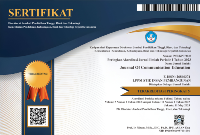PENGARUH KEPEMIMPINAN TRANSFORMASIONAL DAN IKLIM ORGANISASI TERHADAP KINERJA DOSEN
Abstract
ABSTRACT
The qualified performance of lecturers is needed by the university to raise the lecturer itself academic qualification performance, the institution performance and satisfaction of the stakeholders. There are some factors which can accomplish the lecturer's performance, such as transformational leadership and organizational climate. This research tested the effect of transformational leadership and organizational climate on the performance of lecturers by taking Universitas Muhammadiyah Tangerang as a case. Population and sample is 172 lecturers of Universitas Muhammadiyah Tangerang with census method. The statistic approach of the research is simple and multiple linear regression with SPSS 16.0 for Windows program to process the data. The result was transformational leadership gave a positive effect and significant on the organizational climate. The transformational leadership and the organizational climate also gave a positive effect and significant on the performance of lecturers partially and simultaneous. The conclusion is a better lecturer's performance on a higher education especially at Universitas Muhammadiyah Tangerang will be reached if the organization leader can implement a suitable transformational leadership and positive organizational climate, so that the Tri Dharma Perguruan Tinggi which is the goal of each lecturer can be accomplished.
Keywords : transformational leadership, organizational climate, lecturer's performance,
higher education
Full Text:
PDFReferences
Aziz, R., N.A. Ishak, P. Abd Ghani, dan R.
Othman. 2009. Transformational
Leadership towards
WorldClassUniversity Status: Emering
Global Model Plus. Journal of Global
Management Research, Institut Fidal Inc.
Avolio, B.J., B.M. Bass, D.I. Jung. 1999. ReExamining the Components of
Transformational and Transactional
Leadership Using the Multifactor
Leadership Questionnaire. Journal of
Occupational and Organizational
Psychology, 72, 441-462
Bass, B.M. 1997. Personal Selling and
Transactional/Transformational
Leadership. Journal of Personal Selling
& Sales Management, Vol. XVII, No. 3
(Summer 1997, Pages 19-28)
-------------. 1999. Two Decades of Research
and Development in Transformational
Leadership. European Journal of Work
and Organizational Psychology, 8 (1), 9-
-------------, B.J.Avolio, D.I. Jung, dan Y.
Berson. 2003. Predicting Unit
Performance by Assessing
Transformational and Transactional
Leadership. Journal of Applied
Psychology, Vol. 88, No. 2, 201-218
Boyer, M. 2010. Alaska Editorial:
Transformational Leadership Needed at
University of Alaska. Melalui
stories/030210/opi_569710894.shtml>
/05/10]
Comm, C.L. dan D.F.X. Mathaisel. 2000.
Assessing Employee Satisfaction in
Service Firms: An Example in Higher
Education. The Journal of Business and
Economic Studies, Vol. 6, No. 1, pp. 43-
Davis, K. 1993. Organizational Behavior
Human Behavior at Work. 2nd Ed.New
York: MacGraw-Hill
Gurr, D. 1996. On Conceptualising School
Leadership: Time to Abandon
Transformational Leadership?. Leading
and Managing, Vol. 2[3], pages 221-239
Hersey, P., K.H. Blanchard dan D. Johnson.
Management of Organizational
Behavior: Utilizing Human Resources,
th Ed.Englewood Cliffs, NJ: Prentice
Hall, Int'l
Jabnoun, N. dan H.A. Al-Ghasyah. 2005.
Leadership Styles Supporting ISO
:2000. The Quality Management
Journal, 12, 1, pp. 21-29
Patterson, M.G. et al. 2005. Validating the
Organizational Climate Measure: Links
to Managerial Practices, Productivity
and Innovation. Journal of
Organizational Behavior, Vol. 26, pp.
-408
Podsakoff, P.M., S.B. MacKenzie, R.H.
Moorman, dan R. Fetter. 1990.
Transformational Leader Behaviors and
their Effects on Followers' Trust in
Leader, Satisfaction, and Organizational
Citizenship Behaviors. Leadership
Quarterly, Vol. 1, No. 2, pp. 107-142
Pounder, J.S. 2001. “New Leadership” and
University Organizational Effectiveness:
Exploring the Relationship. Leadership
& Organization Development Journal,
Vol. 22, No. 6, pp. 281-290
-----------------. 2003. Employing
Transformational Leadership to Enhance
the Quality of management Development
Instruction. The Journal of Management
Development, Vol. 22, No. 1, pp. 6-13
Rahyuda, A.G. 2008. Pengaruh
Kepemimpinan Transformasional dan
Sistem Kompensasi terhadap Kinerja
Dosen. Tesis Program Studi Teknik dan
Manajemen Industri Institut Teknologi
Bandung
Robbins, S.P. 1996. Perilaku Organisasi:
Konsep, Kontroversi, Aplikasi.
erjemahan Hadyana Pujaatmaka.
Jakarta: Prenhallindo
Sarros, J.C., J.H. Gray, dan I.L. Densten.
Leadership and Organizational
Culture. AIMMonashUniversity
Leadership Report
Seniati, L. 2006. Pengaruh Masa Kerja,
Trait Kepribadian, Kepuasan Kerja, dan
Iklim Psikologis terhadap Komitmen
Dosen pada Universitas Indonesia.
Makara, Sosial Humaniora, Vol. 10, No.
, 88-97
Spreitzer, G.M., K.H. Perttula, dan K. Xin.
Traditionally Matters: An
Examination of the Effectiveness of
Transformational Leadership in the
United States and Taiwan. Journal of
Organizational Behavior, 26, 205-227
Stewart, J. 2006. Transformational
Leadership: An Evolving Concept
Examined through the Works of Burns,
Bass, Avolio, and Leithwood. Canadian
Journal of Educational Administration
and Policy, Issue #54.
Vijayakumar, V.S.R. 2007. Management
Styles, Work Values and Organizational
Climate. Journal of the IndianAcademy
of Applied Psychology, Vol. 33, No. 2,
pp. 249-260
Wan Mustafa, W.S.dan H. Kamis. 2007.
Prioritizing Academic Staff Performance
Criteria in Higher Education Institution
to Global Standards. Proceedings of the
th Asia Pasific Management
Conference, Melbourne, Australia, 1281-
Woodman, R.W. dan D.C., King. 1978.
Organizational Climate: Science or
Folklore. The Academy of Management
Review, Vol. 3, No. 4, pp. 816-826
Xenikou, A. dan M. Simosi. 2006.
Organizational Culture and
Transformational Leadership as
Predictors of Business Unit
Performance. Journal of Managerial
Psychology, Vol. 21, No. 6, pp. 566-579
Yukl, G. 1989. Managerial Leadership: A
Review of Theory and Research. Journal
of Management, Vol. 15, No. 2, pp. 251-
DOI: https://doi.org/10.58217/joce-ip.v13i2.187
Refbacks
- There are currently no refbacks.
LPPM Universitas Insan Pembangunan Indonesia
Jl. Raya Serang Km. 10 Bitung, Curug, Tangerang 15810
Telp. 021-59492836 / 02159492837
Website : http://www.lppm.ipem.ac.id
Email : lppm@ipem.ac.id
 Ciptaan disebarluaskan di bawah Lisensi Creative Commons Atribusi-BerbagiSerupa 4.0 Internasional.
Ciptaan disebarluaskan di bawah Lisensi Creative Commons Atribusi-BerbagiSerupa 4.0 Internasional.





